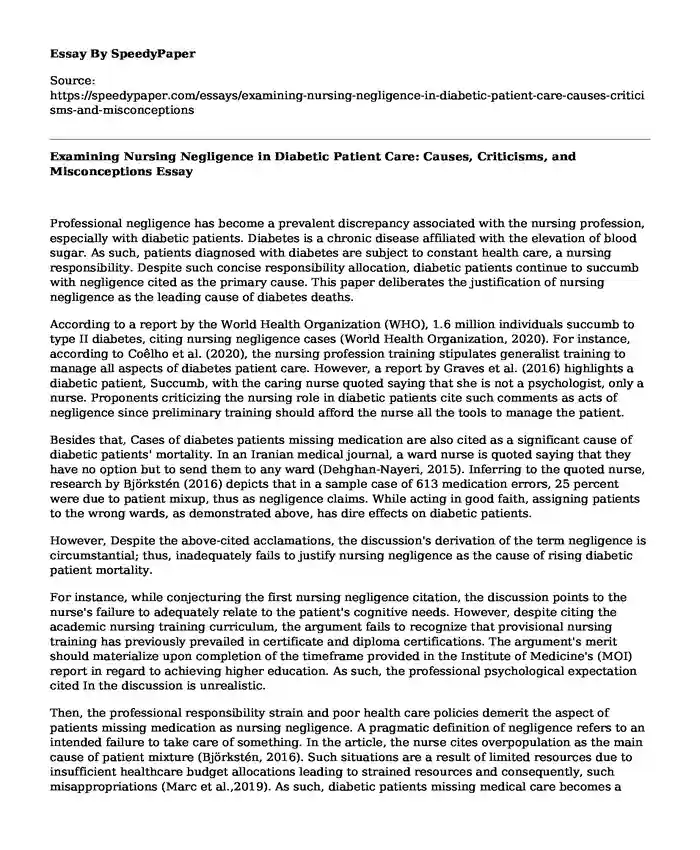Professional negligence has become a prevalent discrepancy associated with the nursing profession, especially with diabetic patients. Diabetes is a chronic disease affiliated with the elevation of blood sugar. As such, patients diagnosed with diabetes are subject to constant health care, a nursing responsibility. Despite such concise responsibility allocation, diabetic patients continue to succumb with negligence cited as the primary cause. This paper deliberates the justification of nursing negligence as the leading cause of diabetes deaths.
According to a report by the World Health Organization (WHO), 1.6 million individuals succumb to type II diabetes, citing nursing negligence cases (World Health Organization, 2020). For instance, according to Coêlho et al. (2020), the nursing profession training stipulates generalist training to manage all aspects of diabetes patient care. However, a report by Graves et al. (2016) highlights a diabetic patient, Succumb, with the caring nurse quoted saying that she is not a psychologist, only a nurse. Proponents criticizing the nursing role in diabetic patients cite such comments as acts of negligence since preliminary training should afford the nurse all the tools to manage the patient.
Besides that, Cases of diabetes patients missing medication are also cited as a significant cause of diabetic patients' mortality. In an Iranian medical journal, a ward nurse is quoted saying that they have no option but to send them to any ward (Dehghan-Nayeri, 2015). Inferring to the quoted nurse, research by Björkstén (2016) depicts that in a sample case of 613 medication errors, 25 percent were due to patient mixup, thus as negligence claims. While acting in good faith, assigning patients to the wrong wards, as demonstrated above, has dire effects on diabetic patients.
However, Despite the above-cited acclamations, the discussion's derivation of the term negligence is circumstantial; thus, inadequately fails to justify nursing negligence as the cause of rising diabetic patient mortality.
For instance, while conjecturing the first nursing negligence citation, the discussion points to the nurse's failure to adequately relate to the patient's cognitive needs. However, despite citing the academic nursing training curriculum, the argument fails to recognize that provisional nursing training has previously prevailed in certificate and diploma certifications. The argument's merit should materialize upon completion of the timeframe provided in the Institute of Medicine's (MOI) report in regard to achieving higher education. As such, the professional psychological expectation cited In the discussion is unrealistic.
Then, the professional responsibility strain and poor health care policies demerit the aspect of patients missing medication as nursing negligence. A pragmatic definition of negligence refers to an intended failure to take care of something. In the article, the nurse cites overpopulation as the main cause of patient mixture (Björkstén, 2016). Such situations are a result of limited resources due to insufficient healthcare budget allocations leading to strained resources and consequently, such misappropriations (Marc et al.,2019). As such, diabetic patients missing medical care becomes a consequence of poor government policies rather than nursing negligence.
Conclusion
In conclusion, the essay discusses a protracted justification argument that nursing negligence is the leading cause of diabetic patient fatality. The criticizing proponents cite two cases; highlighting a nurse's lack of cognitive engagement with a diabetic patient and, misappropriation of patient ward allocation and eventual failure to get the required medicine. However, these justifications are repudiated by a lack of sufficient training knowledge cited concerning the MOI 2010 report. Further, poor government policies are cited for patient misappropriation and subsequently missing medication.
References
Björkstén, K. S., Bergqvist, M., Andersén-Karlsson, E., Benson, L., & Ulfvarson, J. (2016). Medication errors as malpractice-a qualitative content analysis of 585 medication errors by nurses in Sweden. BMC health services research, 16(1), 431.
Coêlho, M. C. V. S., Almeida, C. A. P. L., Silva, A. R. V. D., Moura, L. K. B., Feitosa, L. G. G. C., & Nunes, L. B. (2018). Training in diabetes education: meanings attributed by primary care nurses. Revista brasileira de enfermagem, 71, 1611-1618.
Dehghan-Nayeri, N., Ghaffari, F., & Shali, M. (2015). Exploring Iranian nurses' experiences of missed nursing care: a qualitative study: a threat to patient and nurses' health. Medical journal of the Islamic Republic of Iran, 29, 276.
Graves, H., Garrett, C., Amiel, S. A., Ismail, K., & Winkley, K. (2016). Psychological skills training to support diabetes self-management: qualitative assessment of nurses' experiences. Primary care diabetes, 10(5), 376-382.
Marc, M., Bartosiewicz, A., Burzynska, J., Chmiel, Z., & Januszewicz, P. (2019). A nursing shortage–a prospect of global and local policies. International nursing review, 66(1), 9-16.
World Health Organization. (2020). Diabetes. https://www.who.int/health-topics/diabetes#tab=tab_1
Cite this page
Examining Nursing Negligence in Diabetic Patient Care: Causes, Criticisms, and Misconceptions. (2024, Jan 28). Retrieved from https://speedypaper.net/essays/examining-nursing-negligence-in-diabetic-patient-care-causes-criticisms-and-misconceptions
Request Removal
If you are the original author of this essay and no longer wish to have it published on the SpeedyPaper website, please click below to request its removal:
- Essay Example on a Health System That Keeps Us Healthy
- Would a Border Fence Solve the Immigration Problem in the United States?
- Black Americans Do Not Trust the Medical Sector. Free Essay
- Free Essay: The Effects of Methylphenidate on Female and Male Fertility
- Essay Sample on Advantages and Disadvantages of Vaccines
- Free Essay: How Social Media Contribute to Anxiety and Depression
- Paper on Nursing Through Crisis: Societal Impact and Mental Health Challenges During the Pandemic
Popular categories





